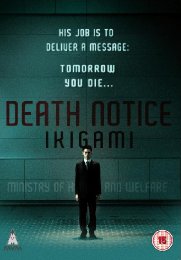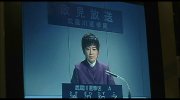Review for Death Notice: Ikigami
Introduction
MVM haven't really set my world alight when it comes to their live-action offerings. That's a concern, given that they have cut back on their anime releases of late, especially as they started off so strongly with Cutie Honey and Dororo. Not being a horror fan, I've avoided that part of their live action catalogue, but what I have seen has been mostly b-movie fare, with run of the mill disaster epics 252: Sign of Life and The Sinking of Japan the only two to even mildly entertain me. The less said about Blood, the better, while Geisha Assassin may have troubled the 'so bad that it's good' category, were it not that the UK is saturated with such schlock from Japan, some of it surprisingly high quality. With titles like Alien vs. Ninja, Hard Revenge Milly, and Robogeisha on the market, Geisha Assassin never stood a chance.
Thinking back on those first two films, I believe it's because they are titles that play to MVM's strength, 10 years of experience selling anime, that they worked so well. Both Cutie Honey and Dororo are titles based on anime and manga, with Cutie Honey a remake of Go Nagai's classic piece of pink bubblegum, while Dororo is an adaptation of one of the father of anime, Osamu Tezuka's classic titles. So when Ikigami fell into my review inbox, and I rushed to the Interweb to read up on the blurb, I have to admit that I was heartened to see that it too was based on a best selling manga. That was tempered somewhat by learning that the film has been re-titled for the UK market, as Death Notice: Ikigami. That smacks of riding on Death Note's coattails, even though the two stories have nothing in common.
How do you create a nation of peace and prosperity for all? Easy, you kill off your youth. At least that's what happens in the particular version of Japan as presented in Ikigami. The idea is that once people realise just how precious and ephemeral life is, they will live life to the fullest, contributing their utmost to society. It begins at age six, when a child first enters school. As part of their medical exam, they are given a vaccination. One in a thousand of these vaccinations contain an implant, and later in life, between the ages of 18 and 24, that implant will activate, killing its host. It's not a perfect system, but evidently it works, as both crime and suicide rates decline.
Kengo Fujimoto was one of the 999 in a thousand that made it to his 25th birthday, but he was one of the privileged few that got a job at the Ministry of Health and Welfare, working to deliver the Ikigami. His job is to inform those scheduled to die, that they have entered their final twenty-four hours. They will be able to live their lives to the fullest, at the expense of the state, and their dependents will receive a suitable pension, but if they should commit a crime in those 24 hours, they will lose those rights. We follow Fujimoto as he informs Tsubasa Tanabe, an aspiring musician on the verge of his big break that his time is up. He then tells Naoki Takazawa, a reclusive dropout, whose mother is running for political office, that he is destined to die. Finally, he tells Satoshi Iizuka of his death sentence. Satoshi Iizuka and his sister Sakura were both orphaned as children, in a car accident that blinded Sakura. If Satoshi can live for just one hour more, she will get the operation that will restore her sight. But this is a Japan where laws are absolute, where even thinking the wrong thing is a crime.
The Disc
Ikigami gets a fairly average 1.85:1 anamorphic transfer, that's hampered only a little by the usual NTSC-PAL standards conversion. There's a deliberate layer of grain, which masks the softness, and there is only the slightest of ghosting. It's clear enough throughout, and certainly watchable. The DD 2.0 Stereo Japanese track is robust and effective, giving the film sufficient presence, while keeping the dialogue clear. The subtitles are of the player forced variety, and are well timed and free of error. The only extras on the disc are the Ikigami trailers, theatrical and teaser both.
Conclusion
So they called it Death Notice. It doesn't matter if a Death Note fan picks Ikigami up by mistake as a result, as they are in for a treat. Ikigami is the best live action feature that MVM have released to date, and if you are a fan of foreign cinema, especially foreign cinema that offers something different, tries to innovate, and generally break free of the usual tropes and clichés, then Death Notice: Ikigami is a must buy. There's been a recent trend in anime adaptations, in films like 20th Century Boys, and yes, Death Note, to opt for source material with depth and complexity, requiring a translation to the silver screen that is sophisticated and layered, thoughtful and subtle, not just an immediate, in your face hit of visual splendour. Ikigami is probably the most impressive of such adaptations that I have seen so far. It is indeed layered and complex, with much to say as a social satire, a very appealing, but simply executed sci-fi concept, much in the tradition of Philip K. Dick, and it also tells a very human story, with heart and emotion that manages to engage the viewer in every sense.
As with many such sci-fi concept stories, the concept itself is very simple, just a tweak of our society that renders it just one step beyond. Here it is a society that randomly culls its young, in order to maintain law and order, peace and prosperity, and through fear, an awareness of mortality, and a desire to live life to the fullest, it somehow works. It works on a societal scale, but on a personal human scale it's a lot different. Of course such a harsh society would have its detractors, which is why even thinking, espousing opposing beliefs is a crime that is punished with 're-education', as we learn on the day that Kengo Fujimoto is inducted into his new job, and a nearby inductee vociferously protests.
Kengo is our eyes into this distorted worldview, but the film wisely doesn't focus overly on the issues behind the concept, but rather opts to tell three very human tales of those whom Kengo must deliver into the next world. It becomes a much more accessible tale of how people face their deaths, and how they re-evaluate their lives. The lottery nature of the law becomes apparent early on, it targets contributors and delinquents alike, and has no respect for position or potential. Tsubasa Tanabe has the most potential, a talented musician that is just on the verge of a big break, he gets his death notice the day before an appearance on a television show. But as we learn, not everything is perfect in his world, and he has had to make sacrifices for his success. The 24-hour deadline makes him reflect on the choices he made, and he decides to use his remaining time to rectify those mistakes and compromises.
If that's the fairy tale ending to a life, following an Ikigami, Naoki Takazawa's response is far more understandable from our perspective. He fights, he rails, he screams, he denies the inevitable, and of course he blames everyone around him. The irony of it is, is that he is a hikkikomori, a social recluse and a dropout from society, with neither hope nor ambition. Yet his mother is a vociferous politician, an eager supporter of the law, campaigning strongly off it, in order to be elected. Her response when she learns of her son's impending death is chilling. Yet she hides a secret past that will determine what happens to Naoki.
The first rule of the job is to not get involved beyond delivering the Death Notice, yet Kengo strays uncomfortably close to the edge of the line with Naoki Takazawa. With Satoshi Iizuka, he crosses it completely. His delivery of the Ikigami is merely the end of a tragic life, as Satoshi and his sister Sakura were orphaned in a car crash that left Sakura blind. Since then, he's always promised to take care of her, and he goes as far as lying to make the world better for her than it actually is. When we meet them, he's proudly announcing that his business is booming, and that she can move from the orphanage, and live with him in a nice apartment. Of course he neglects to mention that his business is actually working as an enthusiastic debt collector. But for Satoshi, the world revolves around his sister, and the one thing he wants is the cornea transplant that will restore her sight. If the cloud of the Ikigami does have a silver lining, it's that he will be allowed to act as donor for his sister. Except that Kengo's blundering renders that impossible. He's forbidden to interfere further in Satoshi's final day, but he's the only one who can fix the situation.
And as these three emotional and heartfelt tales are unfolding, we begin to see the unsettling extent of the effect this law has on society, the Big Brother nature that ensure that the law is followed and upheld, and the draconian measures enacted against those who speak out. It's hard to vote out a bad law, when everyone in society is 'educated' to believe that it is good. And we get to see how this law is enacted, and how being given the 'honour' of carrying out its dictates has an effect on Kengo Fujimoto, his gradual disillusionment with the system, the sowing of the seeds of a subtle and quiet rebellion. It's a very neat and elegant way in which the story is told, I watched it expecting three very individual and human tales, seeing people face their final moments in differing ways, but got something a lot more whole and integrated. It really feels like one story, a story that demands a sequel. I'd love to see just where the world of Ikigami goes next, and I hope that they make more.
You can find touches of other films, influences and nods within Ikigami. Certainly the limited lifespan concept is familiar from films like Blade Runner and Logan's Run. The vilification of youth by a Japanese society has seen a more brutal treatment in Battle Royale, the society constantly under CCTV surveillance, the hunting down of thought criminals is very Orwellian, and 1984, while the army of dour, monotone bureaucrats in the Ministry of Health and Welfare, dealing out death in triplicate adds a surreal touch that is very much like Gilliam's Brazil. At the same time, the character of Fujimoto, an outsider looking in, and very much a maverick in his work, combined with the sedate, measured pace of the film, very much reminds me of Ginko the Mushi-shi, in the series of the same name. Yet given all that, Ikigami is very much its own creation, and I have never seen anything like it before.
Ikigami is a great little movie. It's got smart, sophisticated, and empathetic storytelling of the sort that you rarely expect from a manga adaptation. It has a delicious, dark and chilling sci-fi concept to it that certainly isn't out of the bounds of possibility. If there is a flaw that some may not appreciate, it does get overly melodramatic and a little saccharine with its storytelling. Given the nature of the stories though, that is forgivable, and as Kengo's immediate superior wryly tells him, everyone likes melodrama. Ikigami is the best live action film I have seen from MVM so far, and you really shouldn't miss out on it.









































































Your Opinions and Comments
You write well; far better than me. You were descriptive without boring me and raised my expectations. Cheers for the paragraphs!
Based on your descriptions of the three arcs covered (all are present in the manga) and the screenshot showing the 'hikki' aiming a gun alone, I can tell it's a faithful adaptation. It's disheartening that Dr. Kubo wasn't included but, if only because Ikigami is essentially a collection of moving episodic shorts, it SHOULD prove to be a far better adaptation than the overly dramatic, heavily diverging Death Note films.
I seriously recommend you buy the manga, since you rated the adaptation 9/10. Its art is outstanding and Viz released the series in a larger than average format.
PS: If you haven't already, read the Battle Royale manga. The terrible movie is no more than a collection of badly acted death scenes, with zero characterization.